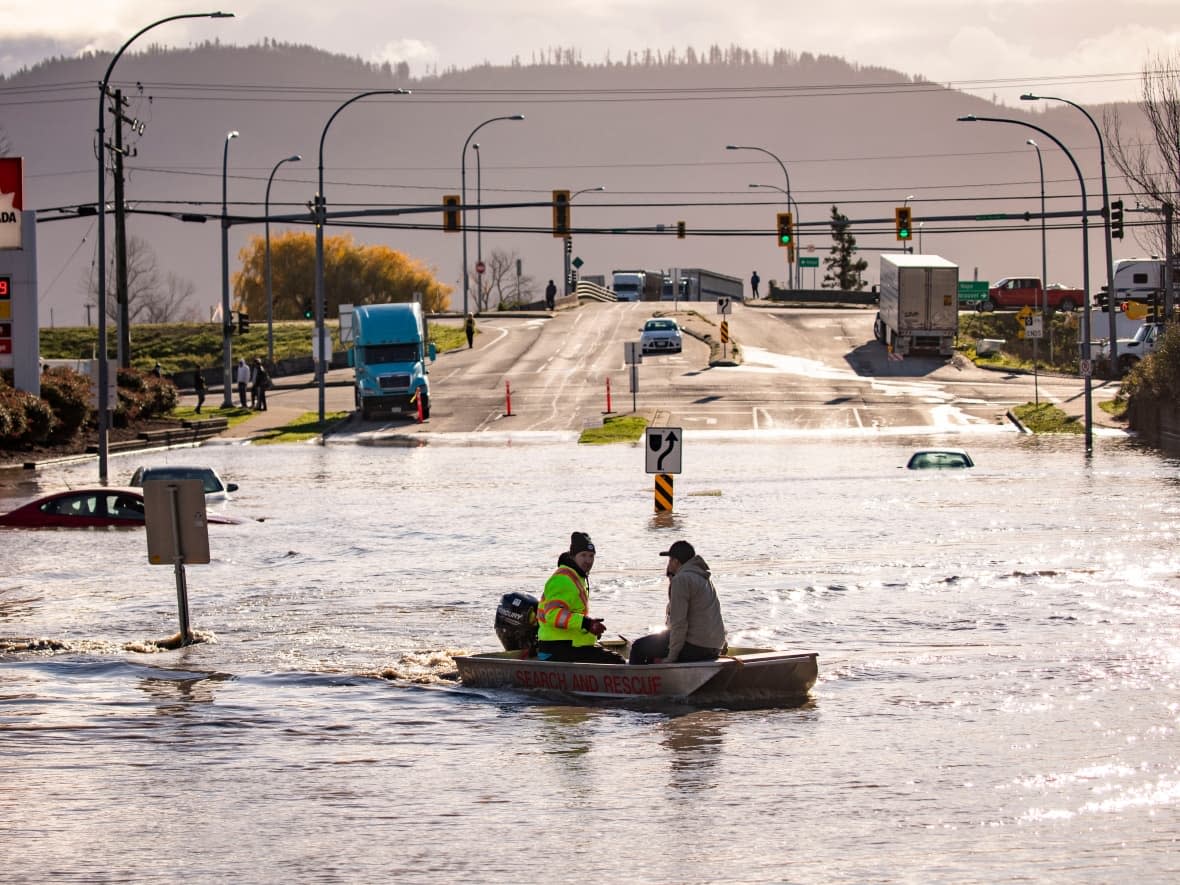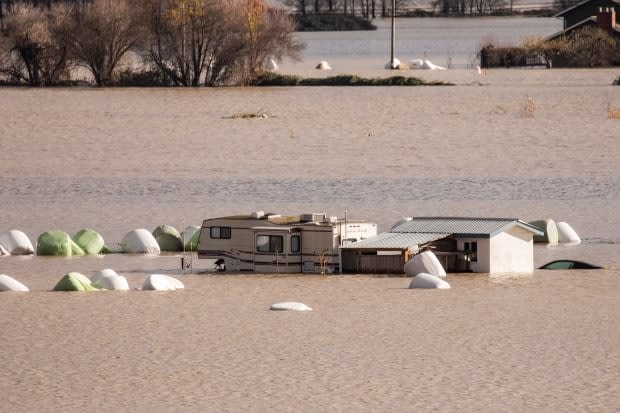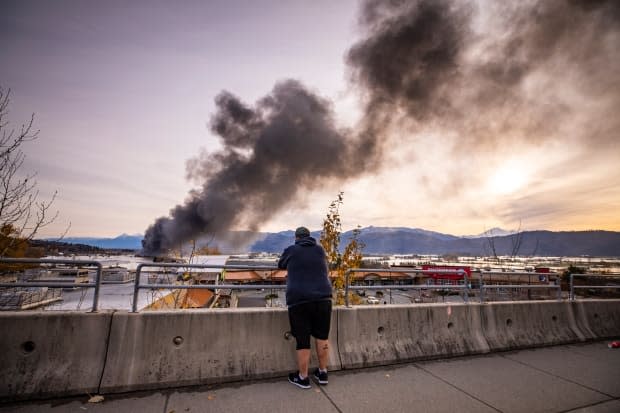B.C. declares state of emergency in wake of devastating flooding, mudslides

THE LATEST:
The B.C. government has declared a state of emergency effective noon PT Wednesday.
Thousands remain evacuated from towns in southern B.C., including Merritt and Princeton.
Highway 7 has reopened for westbound travellers stranded in Hope.
British Columbia's government declared a provincewide state of emergency effective noon PT Wednesday, Premier John Horgan said at a news conference.
The announcement comes after record-breaking rainfall caused major flooding and several mudslides that left hundreds of people in the Lower Mainland stranded or cut off from essential services.
According to the premier, the declaration will give the government greater flexibility to help keep goods moving, as major road closures have hampered the supply chain.

Thousands of people have been displaced from their homes and one woman was confirmed dead Tuesday after a mudslide swept across a portion of B.C.'s Highway 99. Investigators have received reports of at least two other people who are missing.
"We expect to confirm even more fatalities in the coming days," said Horgan.
The state of emergency is in effect for 14 days, with the possibility of extending it if needed.
It is intended to help the government get rail and roadways back up and in operation.
"Our focus is on clearing, repairing and reopening roads to connect the Interior and the North to the Lower Mainland and Vancouver Island, to get our supply chains moving," Transportation and Infrastructure Minister Rob Fleming said in a statement.
WATCH | Premier John Horgan declares state of emergency:
Fraser Valley situation
In the Fraser Valley, evacuation orders remain for residents in the Sumas Prairie area of Abbotsford. An evacuation order for the community of Yarrow and Majuba Hill in Chilliwack was downgraded to an evacuation alert Tuesday evening.
Abbotsford city officials said Wednesday morning that 184 people had been rescued from the Sumas Prairie area overnight with support from the local police, fire and search and rescue teams. In Chilliwack, officials say 640 evacuees have already registered at an emergency reception centre.
Residents in areas of both cities under evacuation alert were endangered by what officials called the "imminent failing" of the Barrowtown Pump Station, which, as of Tuesday night, was the only thing keeping excess water flow from the Fraser River from entering the flooded area.

The station was also in danger of being inundated with floodwaters flowing north from the Nooksack River in Washington state.
However, city staff and volunteers in Chilliwack and Abbotsford worked through the night to build a 25-metre dam around the station to hold back the rising water.
Abbotsford Mayor Henry Braun said Wednesday morning the dam has bought the city some much-needed time and protection.
The University of the Fraser Valley in Abbotsford has cancelled classes for the rest of the week, and schools in Chilliwack and Hope were closed Wednesday.

RV dealership fire
A large structural fire that was burning at an RV dealership in Abbotsford, in the area of Sumas Mountain Road and North Parallel Road, has now been extinguished.
According to officials, around 100 RVs out of about 500 on the lot were on fire Wednesday morning.
"This truly was a team effort from all involved to prevent further damage and spread," the Abbotsford Police Department said in a statement.
Earlier, residents who had remained in the area were being asked to stay indoors as smoke from the fire could be toxic.
Cut off and stranded
All four highways that connect the Lower Mainland with the rest of the province have been closed by landslides and flooding that dumped a month's worth of rain over two days.
Thousands of evacuees remain in more than 20 evacuation centres across the province, with the city of Hope hosting 1,100 people who are currently cut off from the Lower Mainland. Officials said they are working to provide an access road to the community.
Fleming said Tuesday crews had begun work on restoring the province's highway network, but did not have specific timelines for when crucial arteries would reopen.
Fleming said Highway 3 might be able to reopen by the end of the weekend, but he wouldn't hint at when the Trans Canada Highway (Highway 1), the Coquihalla (Highway 5), and Highway 99 would reopen.
As of Wednesday evening, Highway 7, between Agassiz and Hope, was reopened to westbound traffic.
"The intent of this opening is to allow those people stranded in Hope to make their way toward the Lower Mainland," said a spokesperson with the B.C. Ministry of Transportation and Infrastructure. The highway is set to close again following an evacuation of passenger vehicles, with emergency vehicles continuing to have access.
Staff are prioritizing Highway 3 to ensure access to the Interior from the Lower Mainland is not cut off.
Work will take longer on Highway 5 and Highway 1, with staff confirming washouts and mudslides on both routes.
Federal assistance
Public Safety Minister Mike Farnworth said there are still "options" for the province's supply chain at the moment, urging people to be patient.
He chaired the cabinet meeting Wednesday where attendees discussed the need to declare a provincial state of emergency.
Prime Minister Justin Trudeau tweeted that he would be willing to provide any support the province needs.
On Wednesday morning, Minister of Emergency Preparedness Bill Blair said the federal government has approved the deployment of air force personnel to help B.C. deal with the aftermath of the floods.
Also Wednesday, the Canada Border Services Agency said in a statement that given the current situation in B.C., travellers who must pass through the U.S. to get home to Canada are exempt from the COVID-19 pre-arrival test, the test in Canada and quarantine requirements.
READ MORE:
Anyone placed under evacuation order should leave the area immediately.
To find an evacuation centre close to you, visit the Emergency Management B.C. website.
Evacuees are encouraged to register with Emergency Support Services online, whether or not they access services at an evacuation centre.
Road conditions can be checked at DriveBC.


